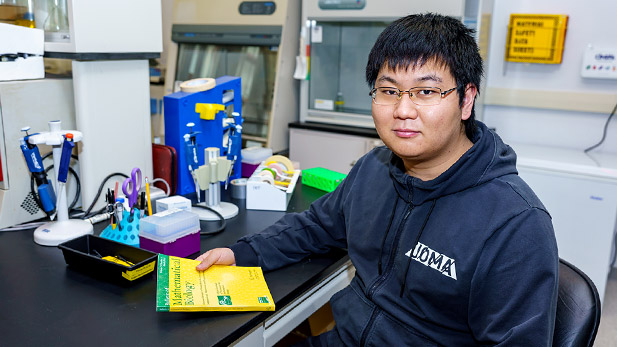Ferguson Zhang Graduates with Research Credit and an Appreciation for Undergraduate Learning at Rose-Hulman

Ferguson Zhang is now graduating early with a major in biology/biochemistry and molecular biology, as well as a worthwhile contribution to a faculty research project. He plans to pursue a PhD at Harvard Medical School.
Ferguson Zhang entered Rose-Hulman as a biology major interested in genetics. His interests expanded as the years progressed and he was mentored by several biology and biomedical engineering professors. Zhang is now graduating early with a major in biology/biochemistry and molecular biology, as well as a worthwhile contribution to a faculty research project.
This Beijing, China, native was introduced to Rose-Hulman by a friend studying chemical science. After looking at several colleges, Zhang chose Rose for its small community feel, low student-faculty ratio and its reputation for faculty-student mentoring.
Born into a family of life science researchers, Zhang’s interest in biology began at a young age. While he is still very much interested in genetics, his fascination with life organism systems and the evolutionary aspect of how those system respond to disease and selection. That interest led to his thesis project, examining evolution using DNA sequence data and showcasing the intersection of biology and computing. The project itself was a collaboration with Assistant Professor of Computer Science and Biology Robert J. Williamson, PhD, and a piece of Williamson’s ongoing research.
Williamson is exploring natural selection in plants. Specifically, his work examines DNA data sets from natural populations of plants and measures the role and prevalence of balancing selection in those data. Balancing selection is a selective process of which different versions of genes are actively maintained in the gene pool of a population at a higher frequency than expected. Balancing selection maintains diversity and differences in populations — whether it is humans, animals or plants — and can help explain why certain populations and genes survive longer and stronger in their environments.
An example of balancing selection in biology is seen in the evolution of disease resistant genes, according to Williamson. “It’s good for the population as a whole to have differences in those genes because that allows people to fight off different diseases,” he says.
Williamson’s ongoing research involved measuring how much balancing selection happened in the history of the species he studies. He is interested in understanding how common balancing selection is in nature and to use the data as a launching point to feed into machine learning algorithms that can more easily identify balancing selection in the future.
Zhang’s thesis project contributed to a subset of Williamson’s work. He examined the genes in Capsella grandiflora by scanning the plant DNA and looking for the strongest signals of balancing selection using different tests. His research yielded a sensible result that genes associated with fighting off diseases experience balancing selection.
“Ferguson’s research has some application to medicine,” says Williamson. “He is excellent as a researcher and a student. I can give him a very difficult problem that would be difficult for second- or third-year PhD student, and he will figure it out. And he has a great way of intuiting how these methods work based on his understanding of genetics.”
Zhang is grateful for the opportunity to be mentored by Williamson, and believes that undergraduate research experience is an example of how Rose sets itself apart as an institution of higher learning.
After graduating in March, Zhang will begin a research training internship at Harvard Medical School. From there, he will attend Harvard Medical School with a joint-PhD research track with the ultimate career goal of being a life science researcher. He plans to specialize in immunology and cancer therapies.